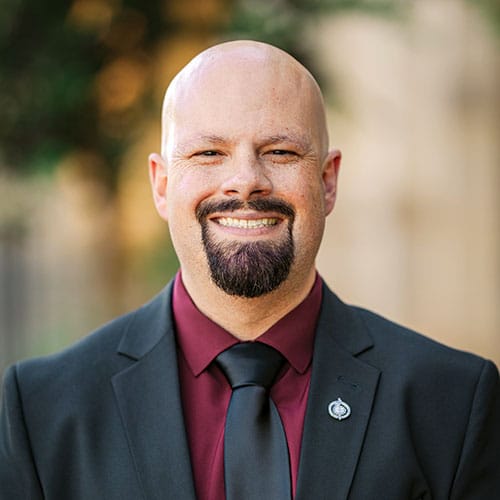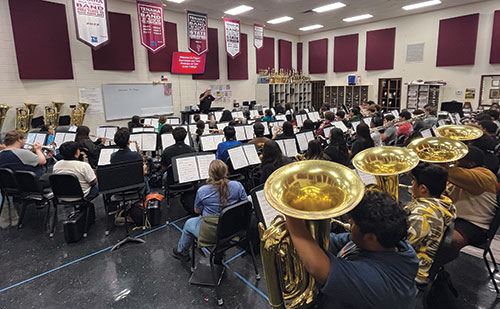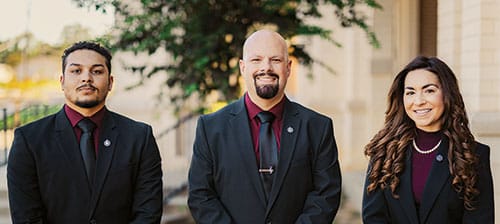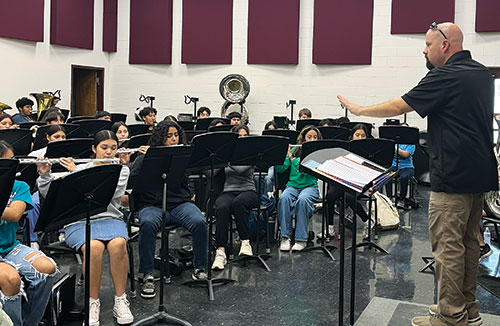
An Interview with Brian Sours
As students from Tenaha, Texas, prepare for their Midwest Clinic debut, many do not fully grasp what they have accomplished. With the motto “It’s Not Okay to be Okay,” their director, Brian Sours, has instilled his musicians with a sense of possibility and fearlessness. The program’s accolades over the last 11 years include selection as the 2025 TMEA 2A Honor Band, a 2022 appearance at TBA as a demonstration group, a 2024 appearance at TMEA as a demonstration group, a first place finish at the UIL Class 2A Marching Band Contest, and recognition as National Winner in the Medal of Distinction National Wind Band Contest in 2022 and 2023.
Now, the band has become the smallest school band ever invited to the Midwest. Before moving to his current position in Tenaha (a town of less than 1,000 citizens), Sours taught for five years at another small school, San Saba ISD. He holds a Bachelor’s Degree in Music Education from the University of Arkansas and a Master’s Degree in Educational Leadership from Stephen F. Austin State University.

How did you get started teaching music in a small school?
I didn’t know I wanted to be a music educator until my junior year of high school. To that point, I had always wanted to be a lawyer, or a politician, and as silly as it sounds, I even wanted to be a professional wrestler at one point. However, realizing that my strengths were in music rather than bodybuilding, I decided it would be best to pursue a career as a band director. I came to this conclusion while watching my band director, John Young, at Wills Point High School turn the band from a division III program into a division I program in a very short time frame. I thought to myself, “That is what I want to do. I want to rebuild a small school band program as well.” After all, I had always enjoyed building/re-building things and making them better when I was younger.
When I arrived at The University of Arkansas, it was an eye-opening experience. I didn’t have the skill set I have now and didn’t even read music that well. I certainly didn’t feel like I fit in with the other very talented musicians around me, but I ended up growing quite a bit as a musician over my years in college. Looking back, I truly enjoyed my time at the University of Arkansas.
After I finished college, I knew I wanted to return to Texas to become a head band director at a small school and turn around a struggling program. I didn’t want to be on staff at a big school. I wanted to do my own thing. Later on, I realized that I probably would have learned even more as a member of a large staff, but it ultimately worked out for me. I decided to come back to Texas because I knew it well. I started applying for jobs and was hired at San Saba ISD. They had a big band for their size school, but they were not a disciplined program when it came to attending rehearsals and other elements that make up a strong program.
The director before me tried to make things better, but he was fighting the established culture of being just okay. I was so bullheaded at first that I refused to accept resistance. This stubbornness resulted in the band shrinking by a third in size during the first year. After making a II-II-III in my first marching contest, I felt defeated. I called John Young, my high school band director and mentor (who is the reason I got into this career), for some advice. He said, “It stings, doesn’t it? Well, you have to get up tomorrow because you still have your job to do, and you will grow from this.” Five years later, that same II-II-III band program marched in the Alamodome to a fifth place finish in finals at the 2013 UIL State Marching Band Contest. Perseverance prevailed!
Along the way during those five years, both the San Saba high school and middle school bands received their first sweepstakes in school history! I very much enjoyed my time in San Saba, and that program continues to be successful today.
My advice for new teachers is not to be afraid to become a director at a small, rural Title I school with a music program that needs attention. So many of those schools have students struggling with home life issues and poverty. Those students need a positive influence in their life and a place where they realize they have talent just as much as those students in affluent suburban school districts.
I would caution first year directors that although they learned a lot in college, they haven’t learned as much as they think. College offers a chance to show that you can stay organized, prove you are willing to learn and grow, develop the life skills of living as an adult, and earn the required diploma. However, most of what you learn happens at your first job. You discover that you are more than just a music educator. You learn that you also have to be an accountant, counselor, medic, and trip planner. Without that first job in San Saba, I would never have had the career I have now with an honor band ensemble, a state championship, or an invited ensemble at the Midwest Clinic.
Without the resources of so many programs in Texas, how have you achieved such incredible success?
Tenaha is one of the few schools in Texas that has been invited to the Midwest Clinic that doesn’t come from a large metro area. Those larger Texas programs that have been invited to the Midwest Clinic have multiple directors and oftentimes 90 minutes to rehearse during the school day (and practice marching band almost exclusively after school). We have just 45 minutes during the school day, and that time must be split with marching band preparation. We share 50% of our band kids with sports and other activities so marching exclusively after school is not an option.
We share so many students because we only have about 390 kids in our entire school district (K-12), and about 75% of the district comes to the band hall every day. Thankfully, I have help from two other directors in the district, Middle School Band Director Shannon Rios and Percussion Director Kale Page. We usually divide up the woodwinds, brass, and percussion between the three teachers, and that is one of the reasons we are successful. I am a tuba player but teach all brass. Shannon is a clarinet player and takes care of the woodwinds and middle school band. She has taught our woodwinds to be some of the best in our classification and has led our middle school band to become one of the most successful small school middle school bands in the state. Kale is a recent alumnus who teaches percussion and was just hired earlier this year after our long-time percussion teacher, Cristie Roye, moved to a larger school just this past year.

Tenaha Directors: Kale Page, Brian Sours, & Shannon Rios
How is parental involvement in your school, and how do you approach the financial side of running a small program?
At our school, 91% of students are economically disadvantaged, 66% are considered At-Risk, and about 30% are ESL. Due to these factors, our school district provides every item that students need for band – instruments, marching shoes, band shirts, reeds, mouthpieces, and oils. I did initiate a $30 band fee a couple of years back to offset costs, but that does not burden our families too much. The school has provided nice instruments, and the program has an inventory of instruments that has been built over time. We would have a shell of our current program if the school district expected students to rent instruments.
One of the difficult things for our band program is that some of the parents do not speak English, so you can’t call them at home as easily as you would like. When I have a parent meeting, I have a translator. Having to wait for each phrase to be translated does make the meetings longer, but it is what is best for our parents. Having parents feel comfortable and informed is our ultimate goal.
In the end, sometimes you have to adjust. You have to be flexible. We must take down the obstacles so that all students can have the opportunity to enjoy music education. While we have a lot of students that participate in multiple activities, we never ask a student to choose between activities. A former superintendent once told me that if you ask students to choose between music and other activities, you are not going to like their choice. Due to our success, if we made students choose, we would probably keep most of our students, but not all of them. We would lose out on some great students, and it’s completely unnecessary.
What made you decide to apply to perform at Midwest?
I attended the Midwest Clinic for the first time in 2023 when Tyler Junior College became the first junior college ever invited. While at the convention, I noticed the small school initiative, and it garnered my interest. Since we had just been invited to appear at the 2024 TMEA convention in February, I considered applying for the Midwest Clinic even though I thought we had a snowflake’s chance in Hades of being invited. Our recordings were great, and along with a solid application and letters of recommendation, we were invited. I told my administration that there is a chance that we might win Honor Band and get invited to Midwest in the same year but that it was very unlikely. The Chief Financial Officer at our district turned to me and said, “Every time you tell me it probably won’t happen, it ends up happening. I’m just going to put money in the budget just in case.” Then, it happened!
In preparing for the Midwest Clinic, the level of balance needed to get everything done has almost been harder than raising money for the trip. My students are excited about the invitation, but they still don’t understand it completely. They have a million other things going on in their lives. For many of the other invited ensembles at the Midwest Clinic, music is life. They may have other activities, but none more important than music. My students just want to go to Chicago. They are working hard for the performance but may not have the same dedication to practicing that you might see from other invited ensembles. We might have won a state championship, won Honor Band, and been invited to the Midwest Clinic; but that still doesn’t mean our students and families place band as their number one activity. Trying to balance a TMEA honor band performance and a Midwest performance with all of the other activities and family responsibilities they have is a difficult task. They have a lot more going on in life than just the band. I’ve learned to respect this and place more value now on their time with their families.

Are you commissioning a work for Midwest?
Yes, Julie Giroux wrote a piece for us. I called her up and said I would like to have something written by her, and she said she would love to do it. I thought it would be something different because you don’t have small schools play Julie Giroux music. When I talked to her on the phone, I discovered that she is the funniest person.
She wrote a piece called Artesian Spring. My understanding is that she was born in South Louisiana. She told me a story that her family used to travel to Hot Springs, Arkansas, and on the way back they stopped at this artesian spring. She started writing the piece and told me that it reminded her of that artesian spring. It was originally going to be a darker ballad, but she said that the music came together in a different way. We will do our best to convey her vision.
How did you craft your Midwest program?
The program developed organically. I started looking up all of the new music. I wanted our program to be almost entirely new music from the last year or two. There were certain pieces we couldn’t select because someone else had played it in the last two years. I really wanted to play Encanto by Robert W. Smith, but another group is playing it. I also wanted to program Declaration Overture by Claude T. Smith but someone played it last year, so I added it to our honor band program instead.
I wanted to play two Grade 1 pieces. Even though we are a high school band, the Grade 1 works deserve to be heard in the Midwest Clinic just as much as the grade 5s. Who else is going to do it? Should a 5A band play more than one Grade 1? No. I believe that should be more of the goal of the small school high school bands. I tried to pick a slow one, a few fast ones, a silly one, one for Christmas, etc. I wanted to have a variety of literature on our program. Something everyone could enjoy. I knew I wanted to include a guest artist so we have included a piece called Party Potatoes by Dr. Benjamin Dean Taylor, which includes a tuba soloist. That’s how our concert fell together.
For our honor band performance in February, we don’t have time to prepare a whole new program. We will add Decoration Overture and drop our Christmas tune and the two Grade 1 works.
Is there anything you had to cut from your program that you regret?
We cut Leroy Anderson’s Sandpaper Ballet, a piece that features three students playing sandpaper blocks at the front because it just wasn’t working out. We may have also programmed one or two pieces too many. We will see. Right now, we can’t look back, we just have to get it learned and perform the best we can.
(At this point in the interview, ten football players arrived at Sours’ office door seeking the supplies to make peanut butter and jelly sandwiches after football practice and before band practice. He reports that his students prefer strawberry jam over grape jam.)
Have there been moments of joy and surprise in your preparations?
Our students have grown in maturity and become much better players. It has been fun to watch the growth. Another side effect of being invited to the Midwest Clinic is that we were finally able to convince our administration to purchase concert attire. We have always worn marching band uniforms even during concert season, but this year we set aside money to buy concert dresses and tuxes. In the future, we will wear the concert outfits during concert season, and it will really feel different from marching season. We are excited to be the smallest school ever invited to the Midwest Clinic and perform for an international audience. Only a handful of schools have ever been a TMEA honor band and Midwest performer in the same year. While it is incredibly demanding, emotionally and physically, we are going to make a lifetime of memories.






